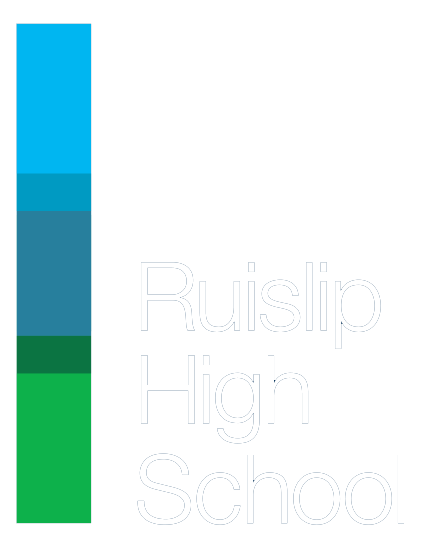English
At Ruislip High School we want to inspire a love of English within every student by introducing them to an exciting and challenging range of writers, texts, cultures and views. The study of English is not only vital for academic success but also to develop the literacy skills required to navigate the world outside of school. We teach students the skills to absorb fundamental information, comprehend dynamic stories and to be able to read between the lines in order to understand the views and messages of others. We also encourage our students to express themselves and develop their creativity through their writing. At Ruislip High School, we give students access to worlds outside of their own that will instil a love of language and literature that will last a lifetime.
Curriculum
Students are taught in mixed-ability classes and follow a thematic curriculum. By teaching individual units with an overall connecting strand per year, students are able to make links across the texts they study and develop their skills and understanding. This is to support retrieval and retention of information and skills across the school year and the key stages so students are always building on and developing their knowledge.
Key Stage 3
The Key stage 3 English curriculum is structured as a ‘What, How, Why?’ model where Year 7 focuses on Character and Voice; the What and Who of the story where they are exposed to different types of characters and voices, exploring what they bring to the stories they are a part of. Students begin by studying Greek myths looking at how heroes and villains have changed over time through the play version of Frankenstein and Trash. Students look at the voices in stories, non-fiction, poems and the media and analyse how this alters our perceptions. Students also utilise their own voices in their writing, embedding critical reading and writing skills from the start of their study of English at Ruislip High School.
Year 8’s theme of Conflict and Disruption looks at How writers develop their stories exploring a range of dystopian and gothic extracts to establish how writers use features such as setting and structure to cause the disruption that builds a story’s narrative. Students read Animal Farm and Sawbones to apply both their knowledge of genre and understanding of structure as well as Romeo and Juliet where the conflict is central to the narrative. Students have lots of opportunities to not only critically analyse the texts expressing their own opinions on them but also write creatively and embed many of these features in their own writing.
Year 9’s Power and Freedom theme focuses on Why texts are written and the writer’s intentions behind them. This theme looks at protest within literature and nonfiction texts, building on the skills students have gained over the previous two years of what a text is about and how it has been pulled together. Students start with a range of non-fiction, fiction and poetry in the Belonging and Othering unit where modern issues are explored focusing on the motivations and intentions the writers may have had when writing. They look at issues in society through Merchant of Venice and the play version of Noughts and Crosses and examine how voice and setting has been utilised to protest in Purple Hibiscus, finishing off Key Stage 3 by writing their own protest speech.
Key Stage 4
Both AQA specifications for GCSE Language and GCSE Literature are taught alongside each other to consolidate skills and to allow students to make connections across the texts studied. Students begin studying fiction and the conventions of different genres. This leads to studying units such as Voices of War where students explore literature texts, fiction and nonfiction, exploring the larger themes and drawing on similarities of content and skills. The texts studied for GCSE literature are: The Strange Case of Dr Jekyll and Mr Hyde, Macbeth, An Inspector Calls and AQA’s Power and Conflict poetry anthology. In studying English language and literature at Ruislip High School, not only are students preparing for their exams, but they are taught to write creatively, express their opinions and concerns in their writing and to critically analyse the information in front of them.
Key Stage 5
The study of English at A Level at Ruislip High School continues the love of literature we strive to embed in all our students. Students study the AQA Literature B specification which focuses on tragedy through Othello, Death of a Salesman, and poems by Keats. The second unit of study is political and social protest through the study of The Kite Runner, The Handmaid’s Tale and Songs of Innocence and Experience. Students are also required to complete an independent study of their own choice of texts where they apply critical theories to analyse their selected novel and poetry. A Level English Literature not only prepares students for exams and further study of the subject in higher education but it builds independence, critical analysis, eloquence in the written form and exposure to a wide array of texts and inspires a love of reading.
Assessment
The English Department uses assessment to identify strengths and weaknesses in student work to help improve and consolidate learning. Assessments are completed in students’ assessment ‘blue’ books where teachers give written feedback on their work. Students have assessment sheets to assist with each of their assessments and all planning for assessments are completed in these books. Directed Improvement and Reflection Time (DIRT) lessons are also completed in these books where students are given the chance to respond to feedback and improve their work.
Assessments follow the schemes of learning and are embedded within the schemes. Assessment follows this format:
- Students are assessed midway through a scheme of learning where teachers give feedback on areas of strength in student work and students correct their own work using this feedback given.
- End of unit assessment: at the end of a scheme of learning, teachers formally assess students on learning that has taken place during a scheme. This is formally marked.
Homework
Homework is typically set using online quizzes which provide instant feedback to students and includes vocabulary and spellings of key words. There are also short fiction and non-fiction extracts to extend reading experience for English Language and/or memorisation of quotes or key knowledge for English Literature.

